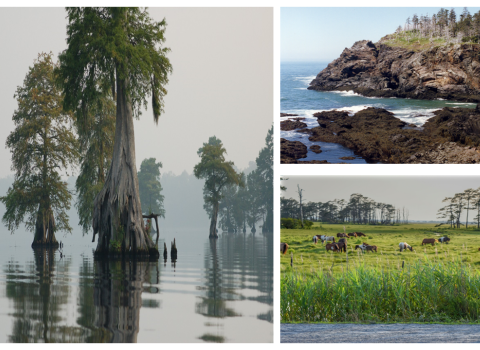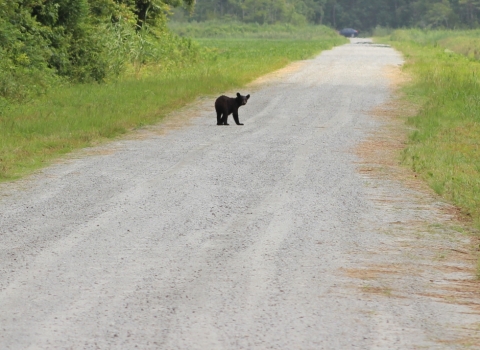In September 2017, Puerto Rico was already reeling from Hurricane Irma, which had doused it with torrential rains and caused widespread damage. Then, two weeks later, Hurricane Maria roared through, killing hundreds of residents, wiping out buildings, entire landscapes of vegetation, and practically the entire electrical grid. It was the worst natural disaster on record for the U.S. commonwealth island, which is still recovering from the Category 4 storm.
Like most U.S. Fish and Wildlife Service staffers, Iván Llerandi-Román, the Partners for Fish and Wildlife Program Caribbean coordinator, “sheltered in place” during Maria, meaning he hunkered down as best he could and rode it out. When the storm finally cleared, Llerandi-Román, like the other Service employees on the island, went to work.
“Conditions were pretty bad,” he said. “Once we knew everyone on staff had survived, we launched our immediate emergency response. We had to do rapid assessments to see what was needed in the communities around us, and how we could deliver them as quickly as possible. Food, water filters, bottled water and power generators were among the most badly needed items.”
Llerandi-Román also checked in on the many collaborators the Partners program had been working with, mostly private landowners who take advantage of the program’s technical advice and financial incentive to improve habitats for endangered, threatened and at-risk species. It’s a popular voluntary program in which landowners manage their land both for profit and for wildlife, which most of the time go hand-in-hand.
One such landowner was José L. Roig. He had been working with the Partners program since 2013, creating a shade-grown coffee plantation in the municipality of Guayanilla. His plantation, which produces the brand Café Roig, serves as a transition habitat between the property’s agricultural lands and a critical wildlife area that is home to seven species listed as endangered under the Endangered Species Act: the seven-foot-long Puerto Rican boa, the sharp-shinned hawk, the broad-winged hawk, and four rare plants.
Starting in 2013, Roig and the Service had planted shade trees on 77 acres of his plantation, which made the land far more beneficial for nesting and feeding for the endangered species and many others on his land. The shading canopy provides shelter, and these plantations “serve as ecological corridors that create buffer zones around natural reserves and provide a smooth transition between urban and natural areas,” Llerandi-Román said.
“Mr. Roig has been a great partner and the lands recently restored under our program have connected forested areas under conservation mechanisms that are protected in perpetuity,” he added.
Shade grown coffee requires little or no chemical fertilizers, pesticides, or herbicides, according to the website eartheasy.com “The shade trees filter carbon dioxide which causes global warming, and aid in soil moisture retention which minimizes erosion.”
They also reportedly produce pretty tasty coffee beans.
But Hurricane Maria dealt a major blow to Café Roig. All of the shade trees that had been planted and nursed over five years simply blew away, as did so many trees on the island.
Once the immediate crisis of Maria had passed, the Partners program got to work with Roig, as well as with other shade coffee plantations in the region. Roig began his own production of coffee trees two months after the storm had nearly ruined him, and is now ready to re-establish the shade trees on his plantation. The Partners program, in collaboration with the local NGO Envirosurvey Inc., is providing about 2,000 native shade trees that will be planted, beginning soon.
“After the traumatic experience we went through,” said Llerandi-Román, “the partnership of Fish and Wildlife, the communities, government agencies, academia, non-governmental organizations and private landowners will prove our resiliency. We will emerge stronger than we were in the past.”


